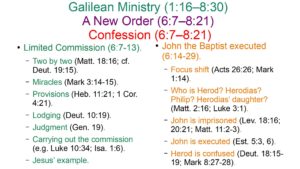The Ministry of Jesus in Galilee
Mark 1:16—8:30
A New King (1:16—3:6).
Kingdom is Near (1:15)
Popularity (1:16-45).
Conflict (2:1—3:6).
Jewish Leaders Reject Him (3:6)
A New Kingdom (3:7—6:6)
Kingdom Has Small Beginnings (4:3)
Continued Conflict (3:7-35).
Parables (4:1-34).
Identity (4:36—6:6).
Jesus’ Town Rejects Him (6:6)
A New Order (6:7—8:21)
Herod & Pharisees (8:15)
Limited Commission (6:7-13).
There are some differences between this rendition of the Limited Commission and what we see in Matthew’s version (Matt. 10).
Matthew adds some things, but there are some clear differences (e.g. what they are to take with them).
These are possibly different events (one in Galilee, another in Judea).
Luke records Jesus sending people out twice, though the second one is the sending out of the 70 (Luke 9:1-6; 10:1-12).
Here, though, we see another example of Mark’s sandwiching of stories—here is the Limited Commission, and they come back later to talk to Jesus about it in 6:30.
This may be a preview of the persecution the disciples are expecting to receive as they preach the gospel—John the Baptist is executed in the middle of this sandwich.
Why do you think they were sent out two by two?
There are a few reasons that the commentators give.
My first thought was the buddy system—there is safety in numbers.
But also providing encouragement and helping one another.
It’s for these reasons I think it’s a good idea to have two people at a time go in door-knocking campaigns and other such evangelistic efforts.
But there is one more possibility: “by the mouth of two or three witnesses, every word may be established” (Matt. 18:16; cf. Deut. 19:15).
People, particularly Jews, were more likely to listen to them with two people proclaiming the gospel.
He also gave them power to perform miracles—casting out demons, but also healing them of their sicknesses (3:14-15).
In Mark 3, Mark foreshadows sending out the Twelve: “that He might send them out” – the indication is that He would send them out later.
He did not give them this power when He first called them, but later when they were sent out.
Recall, this was not a baptism of the Holy Spirit, but it is a giving of miraculous gifts.
There purpose was to preach repentance, confirming their word through the miracles they performed.
They were told to limit the provisions they were to bring with them.

Staff – walking stick, used to help them on their journey, leaning on it when they’re tired or needing something else to brace themselves against (Heb. 11:21), also used as protection if attacked (cf. 1 Cor. 4:21).
Bag – a leather bag for carrying provisions, so no bread or money.
Bread – they were not to carry any food either.
Copper – they weren’t to carry any money in their coin purse/pouch.
Sandals – Matthew says not to carry sandals, probably means they shouldn’t bring an extra pair.
Tunics – just as they were not to carry two tunics. They needed one to wear for modesty’s sake, but they weren’t to carry a second. When traveling, instead of packing all their clothes, they would wear extra clothes for warmth but also to save space. What if their main tunic tore? They needed a spare. Jesus says only to wear one.
 Why did Jesus want them to limit their provisions? It’s silly, right? How can you go on a trip without preparing for it? He wanted them to rely on God for their needs. This sounds like a pat answer, but Jesus is trying to teach them how to do this.
Why did Jesus want them to limit their provisions? It’s silly, right? How can you go on a trip without preparing for it? He wanted them to rely on God for their needs. This sounds like a pat answer, but Jesus is trying to teach them how to do this.
They were to stay in someone’s house while preaching in a particular town.
Typical eastern hospitality required local residents to take in travelers.
We see that go wrong in Gen. 19 and Judges 19, but these were not typical cases—the Law required them to love strangers (Deut. 10:19).
Why were they to stay in that one house while in that area? Some have suggested so that they would not to level up should a “better” offer come along.



